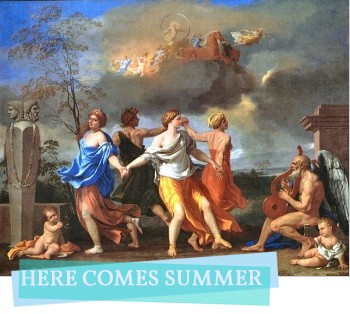Your Summers Are Numbered
by Carl Hegelman

Summer is the invention of privileged classes in the northern latitudes, a time of traveling and ease. You don’t see tropical writers going into paroxysms over summer. Between Cancer and Capricorn, summer isn’t that different from the other seasons. And when it is, it’s a time of heat, when work becomes particularly sweaty and oppressive and you long for the cooling downpour of the monsoon or “the rains.” This is probably true in the southern latitudes, too: name one Australian novel celebrating the glories of summer. Modern summer was allegedly created during the Industrial Revolution, when the new capitalists finally accumulated enough wealth from steam engines and textile factories to wonder what the hell to do with it all. In other words, it began with the exploitation of the masses, and as such should be added to the list of taken-for-granted things we’re supposed to feel guilty about.
We’re taught this decadent concept of entitlement to leisure in childhood. They don’t give you long vacations in January or November, they let you out of school from June/July to August/September. As a privileged first-world kid, you look forward to summer as an endless succession-and like everything in childhood, it does seem endless -of many-houred days full of play and frolic, time spent on the beaches and in backyards. As you grow, summer means long nights of agonized flirtation and courtship, first kisses stolen in the dim, humid warmth of seaside discos, etc. Nearly all the coming-of-age movies, you’ll notice, are set in summer: American Graffiti, The Summer of ’42, Fast Times at Ridgemont High, Breaking Away, The Graduate, American Pie… they all pretty much happen during the cloudless season. This may have something to do with the fact that graduation is in summer, and high school graduation is the main rite of passage from childhood. But why is graduation in the summer?
We of the first world are trained from our earliest days to regard summer as essentially a vacation, and we keep this attitude right on into adulthood. This is especially true of the ultra-privileged. Wall Street, which takes every holiday that’s going (including the ones they don’t really get solidly behind, like Martin Luther King’s birthday), basically shuts down in summer and takes off for the Hamptons or on long trips to the trendiest global watering holes (though still nominally working and cashing its paychecks). If you’re selling a deal on Wall Street, you really have to wait until after Labor Day, because nobody’s going to be giving it any attention during the lazy days. The credit crunch, you’ll recall, began in the summer of 2007, no doubt in part because the dealers and shakers were too busy vacationing to unhang those bridge loans.
Europe is much the same. On Fleet Street, in whose pubs and wine bars British journalists used to hang about in the days before Rupert Murdoch moved everybody out to cheaper real estate, they call summer the “Silly Season,” because Parliament, like Congress, is “in recess” (read: goofing off on Le Continent and in various Caribbean tax havens) and the City is closed; nothing happens in summer and they have to invent human-interest stories to keep their pages filled. Paris, as everyone knows, ceases to exist in August, its matrons flopping about on topless beaches in the south and les gentilhommes gathered there to watch.
In other words, for grown-ups in our first world summer is still basically summer vacation. In 2009, there were 992 million international tourist arrivals (and God knows how many tons of carbon dioxide liberated into the atmosphere from all the trains, boats, planes, tour buses and Viagra manufacturing), most of them in the boreal summer.
Meanwhile, for the world’s less fortunate residents-the six billion who didn’t make an international arrival-summer is mostly about working harder. In India, in the days of Empire, this was when the punkah wallahs (the men who pulled the strings to work the fans that kept the sahibs cool) were called upon to sweat. These days it’s the time when the otherwise unemployed people get jobs waiting tables and being abused by picky rich diners at the summer resorts, or caddying on the golf courses, or driving prom limos, or shepherding tourists around the Acropolis, or rickshawing fat first-worlders around Bangkok, or otherwise being especially menial. In agri-land it’s when the migrant workers get to pick apples, bale hay, and tote barges.
True, this exercise in conspicuous leisure does result in a small redistribution of wealth, as the privileged few scatter crumbs about our touristic paths. It’s not exploitation, we protest: Nobody’s forcing anyone to be a waiter. But it all looks kind of like a tip, doesn’t it? Surely there’s a better way to redistribute wealth?
Ah, yes, there is. Put down your iPhone for a second. Leave your iPad on the couch. Press pause on the Blu-Ray that’s playing on your plasma TV. Listen closely: Come the revolution, summer is going to be one of the first things to go. As Shakespeare himself noted 400 years ago, summer’s lease hath all too short a date. Those six billion underprivileged non-departures will have their day. Such a disparity can’t last forever, it’s against the Third Law of Ecodynamics. The revolution will come, and then summer will end.
Enjoy it while it lasts.
Carl Hegelman (a pen name) is a corporate bond analyst and a connoisseur of leisure.
